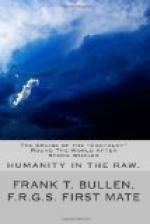For several hours this beautiful appearance persisted, fading away at last as gradually as it came. No satisfactory explanation of this curious phenomenon has ever been given, nor does it appear to portend any change of weather. It cannot be called a rare occurrence, although I have only seen it thrice myself— once in the Bay of Cavite, in the Philippine Islands; once in the Pacific, near the Solomon Islands; and on this occasion of which I now write. But no one who had ever witnessed it could forget so wonderful a sight.
One morning, a week after are had taken our departure from the Seychelles, the officer at the main crow’s-nest reported a vessel of some sort about five miles to the windward. Something strange in her appearance made the skipper haul up to intercept her. As we drew nearer, we made her out to be a Malay “prahu;” but, by the look of her, she was deserted. The big three-cornered sail that had been set, hung in tattered festoons from the long, slender yard, which, without any gear to steady it, swung heavily to and fro as the vessel rolled to the long swell. We drew closer and closer, but no sign of life was visible on board, so the captain ordered a boat to go and investigate.
In two minutes we were speeding away towards her, and, making a sweep round her stern, prepared to board her. But we were met by a stench so awful that Mr. Count would not proceed, and at once returned to the ship. The boat was quickly hoisted again, and the ship manoeuvred to pass close to windward of the derelict. Then, from our mast-head, a horrible sight became visible. Lying about the weather-beaten deck, in various postures, were thirteen corpses, all far advanced in decay, which horrible fact fully accounted for the intolerable stench that had driven us away. It is, perhaps, hardly necessary to say that we promptly hauled our wind, and placed a good distance between us and that awful load of death as soon as possible. Poor wretches! What terrible calamity had befallen them, we could not guess; whatever it was, it had been complete; nor would any sane man falling across them run the risk of closer examination into details than we had done. It was a great pity that we were not able to sink the prahu with her ghastly cargo, and so free the air from that poisonous foetor that was a deadly danger to any vessel getting under her lee.
Next day, and for a whole week after, we had a stark calm such a calm as one realizes who reads sympathetically that magical piece of work, the “Ancient Mariner.” What an amazing instance of the triumph of the human imagination! For Coleridge certainly never witnessed such a scene as he there describes with an accuracy of detail that is astounding. Very few sailors have noticed the sickening condition of the ocean when the life-giving breeze totally fails for any length of time, or, if they have, they have said but little about it. Of course, some parts of the




